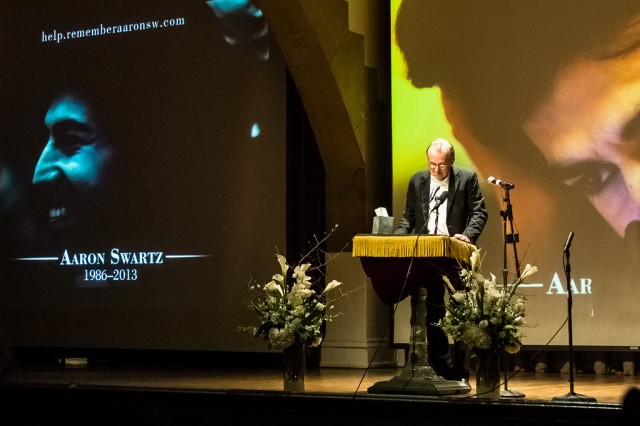There were many powerful speakers during yesterday’s memorial for Aaron Swartz in Cooper Union. Among them was data-visualization pioneer Edward Tufte, whom I hadn’t known had ever collaborated with Aaron. But given their similar orbits in democracy and data, it is not at all surprising that they were friends.
Tufte’s message included a surprising anecdote about his own hacking career. You can watch the video (parts 1, 2)
I’ve transcribed Tufte’s words here for posterity. It’s an interesting piece of hacker history and a touching defense of Aaron Swartz and others who are “marvelously and vigorously different.”
Note: A commenter has pointed me to a full version of Tufte’s talk. I’ll update with his full comments when I have time.
Parts of Democracy Now’s video feed appears to have cut out, as part of Tufte’s opening words are missing in the available feed, but here he is talking about how he and Aaron came to know each other:
[Aaron] tells the story of how he had a choice between taking a final exam or coming to hear me talk. As it turned out, he did both. We then would meet over the years for a long talk every now and then and my responsibility was to provide him with a reading list, a reading list for life
And then about two years ago, Quinn [Norton] and Aaron came to Connecticut, and he told me about the 4 and a half million downloads of scholarly articles. And my first question was:
“Why isn’t MIT celebrating this?”
The archival video feed cut off here and I can’t find the missing excerpt on Democracy Now’s website. From what I remember from being at the memorial, in this part, Tufte related how he told Aaron, half-seriously, that Aaron’s main fault was downloading millions of articles when only a few thousand were worth downloading.
Tufte then said that Aaron asked him if he knew Bill Bowen, the former president of Princeton University and the founder of JSTOR, the digital library that Aaron was accused of illegally accessing.
The second part of the video continues here:
…[Bowen] then became president of the Mellon Foundation and he had retired from the Mellon foundation. But he was asked by he foundation to handle the problem of JSTOR and Aaron.
So I wrote Bill Bowen an email about it. And I said first that Aaron is a treasure. And then I told a personal story about how I had done some illegal hacking as a student and had been caught at it and what happened.
In 1962, my housemate and I invented the first blue box. That’s a device that allows for free, undetectable, unbillable long-distance telephone calls.
And we got this up. And played around with it and at the end of our research came when we completed was what we thought was the longest long distance phone call ever made, which was from Palo Alto to New York time of day, via Hawaii.
Well, during our experimentation, AT&T, on the second day it turned out, had tapped our phone. But it wasn’t until about six months later when I got a call from a gentleman, A.J. Dodge, a senior security person at AT&T. And I said, “I know what you’re calling about”.
And so we met. And he said what we’re doing is a crime…But I knew it wasn’t serious because he actually cared about the kind of engineering stuff and complained that the tone signals we were generating were not up to standard. Because they recorded them and played them back into the network to see what numbers we were trying to reach and they couldn’t break through some of the noise of our signal.
He asked why we went off the air after about three months…And I said, well, we regarded it as an engineering problem and we made the longest long-distance telephone call…and that was it.
And so the the deal was, as I explained to my email to Bill Bowen, was that we wouldn’t try to sell this…we wouldn’t do any more of it, and that we would turn our equipment over to AT&T. And so they got a complete vacuum oscillator kit for making long distance phone calls.
But I was grateful for A.J. Dodge and, I must say, even AT&T, that they decided not to wreck my life.
And so I told Bill Bowen that he had a great opportunity here to not wreck somebody’s life. And of course he thankfully did the right thing.
Aaron’s unique quality was that he was marvelously and vigorously different.
There is a scarcity of that.
Perhaps we can be all a little more different too.
(Thanks to commenter Daniel for pointing out this Youtube full version)
This was the first that I had ever heard of Tufte being associated with phreaking. It’s not that he wouldn’t have the technical chops…it’s just that I couldn’t find any reference to it in the exhaustive articles that have been written about him. Eric Hellman, who also attended the memorial, said he chatted with Tufte afterwards who told him he had never talked of the incident in public.
After listening to Tufte talk, I Googled for any reference of him and Swartz. Here’s Swartz, “a loyal fan,” asking Tufte about the font he uses. And here’s Swartz describing a Tufte lecture.
Watch the rest of the recorded memorial at Democracy Now’s website. The message from Taren Stinebrickner-Kauffman was especially poignant and inspiring.
